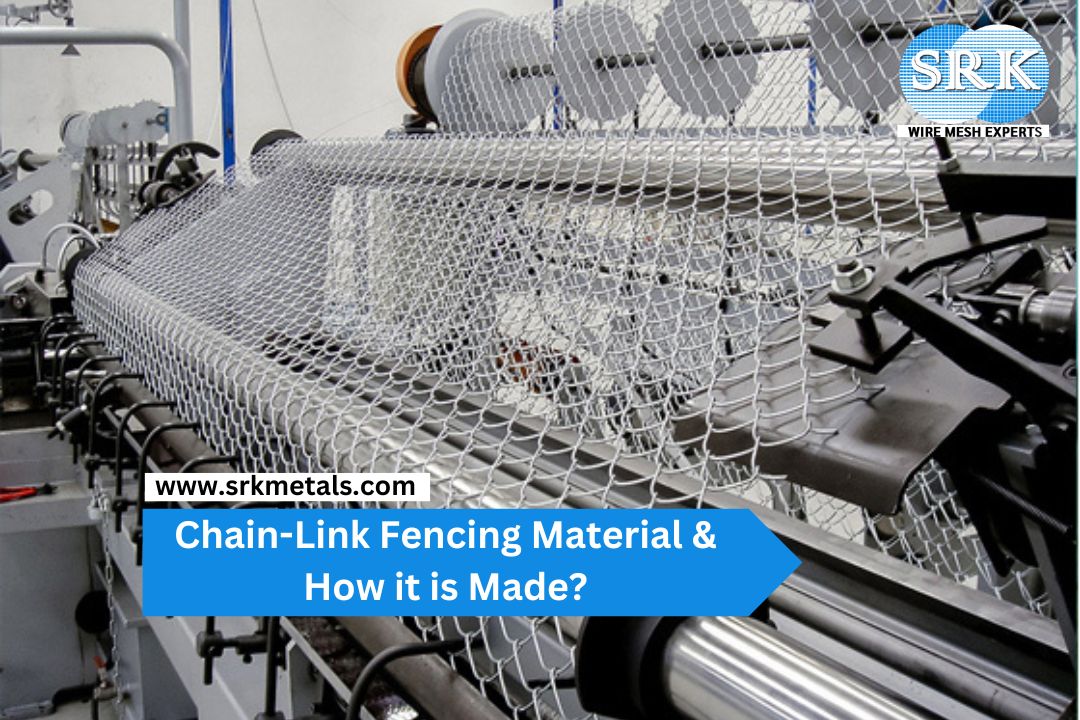Chain-link fences are applicable in a variety of settings, from residential houses to industrial businesses, presenting a cost-effective and dependable answer for security. As we get to the bottom of the layers of this important fencing system, we will discover the function of metal wires and other crucial substances that come together to create barriers that stand the test of time. Let’s begin the journey collectively into the world of chain-link fencing.
In this blog, we delve into the fascinating world of Cyclone Fence: A complete guide about the materials that transform easy metallic wires into strong barriers. We also embark on an adventure to discover the secrets and techniques behind the development method and material used for making chain-link fences, understanding the various components that contribute to their durability, sturdiness, and versatility.
What is a chain-link fence?
A chain-link fence is a style of fence consisting of interlocking metal wire mesh, usually coated in vinyl or made of galvanized steel, that creates a pattern of gaps in the shape of diamonds. In residential, commercial, and industrial environments, it is frequently utilized for containment, boundary marking, and security reasons.
What is a chain-link fence made of?
A chain-link fence is typically made of various types of metals; it may be stainless steel or galvanized steel, where wires are woven into a diamond pattern. These steel wires are often coated with zinc to prevent corrosion and increase durability. Additionally, a chain link fence may also incorporate materials such as aluminum or vinyl for specific purposes, like adding coatings to provide more strength or aesthetic appeal.
The benefits of chain-link fencing
There are various benefits of chain link fencing that cater to diverse applications in various industries. Whether you are looking to secure your boundaries or want to add aesthetic charm to your residential outdoor space, here is why chain-link fences will be the best choice for securing the boundaries:
- Price-effectiveness: When finances are a concern, chain link fences come to the rescue. They’re low-priced but don’t skimp on pleasure, presenting a mighty fee on your investment. With chain-link fences, you also have numerous financing alternatives to make your purchase even less complicated on the pocket.
- Durability: Designed to withstand the various climatic situations that frequently occur, chain-link fences are exceedingly long-lasting. The chain-link fence can withstand harsh weather conditions, like rain or heavy wind, and the fence’s corrosion resistance makes it durable.
- Allows customization: Customization is a breeze with chain-link fencing. Pick out the colors and sizes that are pleasant and healthy according to your property’s requirements. Fences focus on customization, permitting you to design a fence that’s uniquely yours.
- Safety: Beautify your private home’s protection with a chain link fence that doesn’t obscure sightlines and may be augmented with additional features. You can even integrate this with other safety solutions supplied through chain-link fences, including driveway gates, and get access to control systems.
What metallic material is a chain-link fence made from?
The Chain-link Fence is majorly made of steel but the metallic content present in the fence may differ if coatings and other substances are added. Learn in detail about the material and coating in the below mentioned points:
Material: The basic structure of a chain-link fence is often crafted from metal. Steel is an alloy basically composed of iron and a small amount of carbon, lending it superb energy and durability.
This is why it’s widely utilized in numerous applications, from any type of production to automotive production. Its resistance to corrosion and durability make it a suitable fence for fencing. However, not just any steel will do. Chain link fences are also available in various other forms that differ on the basis of coatings.
Coating: To make a chain-link fence more resilient and visually attractive, numerous coatings may be implemented. Right here are some of the most unusual varieties of coatings and their blessings:
- Hot-dipped coating: The hot-dipped coating is a technique that coats the metal with a layer of zinc to shield it from rust and corrosion, thereby increasing its lifespan. It’s exceptional for each residential and commercial application in which lengthy-lasting sturdiness is required.
- Vinyl Coating: It is additionally known as a PVC coating; this offers a smoother finish and extra flexibility in terms of color. If you’re aiming to match the fence with your home’s aesthetic, vinyl coating permits customization.
In case you need assistance choosing the best kind of coating for your preferred application. In addition to that, we’ll speak about the exceptionality of a chain link fence so that you can feel greater confidence in choosing the best chain-link fence..
What to look for in an exceptional chain link fence?
While selecting the best chain-link fence for your project, there are numerous points mentioned, that work ideally with chain-link fencing specifications for a quality check that you have to remember:
- Cord Thickness: The thicker the cord, the more potential and durable the fence is. Thicker wires are more immune to cutting and wear and tear.
- Mesh length: Smaller mesh sizes make it tougher for intruders to climb the fence. However, the smaller the mesh, the better the rate. Find stability that fits your wishes and finances.
- High-Quality Coating: As stated in advance, the type and exceptional quality of the coating can drastically affect the lifespan of your fence. Make sure that the fence you’re considering has a long-lasting coating.
- Installation: A chain-link fence is most effective and appropriate for its installation process. Poorly hooked-up fences can sag, rust, or deteriorate quickly. constantly opt for specialists, like Fences, who have the expertise and devices to ensure a comfy and long-lasting installation.
By now, you have a clearer knowledge of what makes up a chain-link fence and what to look for when deciding to choose a chain-link fence. It’s not just about the mesh or the posts; it’s about the exceptional quality of the materials and the craftsmanship that goes into assembling them. Let’s take a look at the aspect of, how is a chain-link fence made.
How is a chain-link fence made?
A chain-link fence is more than a sequence of interconnected wires. The wires are weaved into a cross-weaving pattern, which creates a chain-like structure. Its manufacturing process is mentioned in detail with well-explained steps.
The production process: step-by-step
Right here’s an internal observation of how a chain-link fence goes from uncooked raw material to a dependable structure. Right here’s the way it works:
- Material Preparation: The whole process starts with steel. It’s straightened and cut into wires, getting ready for the weaving system.
- Twisting and Weaving: specialized machines twist and turn the wires to form the signature diamond pattern, ensuring uniformity and sturdiness in the final product.
- Galvanization: You’ve already learned about the importance of coating. Here, the galvanized coating is implemented via hot-dip galvanization, a technique wherein the woven fence is submerged in a bathtub of molten zinc.
- Coating: should you opt for the PVC coating we previously mentioned, this is the stage wherein that customization takes place.
- Final Assembly: Ultimately, the completed, coated cord chain-link fence is assembled and organized for delivery, frequently with other fittings or accessories.
Related FAQ’s
Q What are most of the chain-link fences made of?
Most chain-link fences are made of steel. In addition, the steel wires used in the manufacturing of chain-link fences are galvanized, which means the wire is coated with a layer of zinc to protect it from corrosion and rust. This GI coating is done in two ways: hot-dipped and electro-galvanizing, which helps enhance the durability and longevity of the fence.
Q What is a steel chain-link fence?
The most common material for chain-link fences is galvanized steel or steel. Galvanization is the process of applying a zinc coating to steel to prevent rust and corrosion.
Q What is a wood chain-link fence?
Typically, chain-link fences are not composed of wood. More often than not, chain-link fence margins or edges are drawn using wood. The main material used to build chain-link fences is galvanized steel.
Q Is a chain-link fence made of aluminum?
Even though steel metal is the most common metallic element for chain-link fences, it can also be fabricated from aluminum. Aluminum chain-link fences are less of an ordinary use than their steel counterparts, as they are very light-weighted and flexible, hence not efficient in providing strength and durability to the projects, but are to be had in the marketplace for specific requirements used for other consequences like chain-link curtains.
Q What materials are required for installing a chain-link fence?
The components needed for the installation of a chain-link fence consist of:
- Chain-link fabric (mesh): the principal body of the fence.
- Line posts: intermediate vertical posts that support the mesh.
- Terminal posts: give-up, nook, and gate posts that provide balance to the fence.
- Tie rail: A horizontal rail at the top of the fence for bringing assistance.
- Tension bands: Connect the mesh to the road posts.
- Tension bars: Offer tension to the chain-link cloth.
- Tie wires: Comfy the fabric to the top rail and line posts.
- Gate hardware: additives for the set-up and operation of gates in the fence.
Conclusion
In conclusion, as we resolve the layers of substances that contribute to the introduction of strong chain-link fences, it will become obvious that the first-rated steel and galvanized metal, specialized coatings, and meticulous production approaches are the key elements behind their sturdiness and flexibility. For those considering a chain-link fence, the blessings are numerous, starting from cost-effectiveness to customization options, durability, and more advantageous security. The utilization of metal, a robust and corrosion-resistant material, is further fortified by means of coatings like hot-dipped galvanization or PVC, offering safety against rust and aesthetic appeal.
When deciding on a chain-link fence, it’s essential to be aware of factors that include wire thickness, mesh size, and the quality of the coating. Additionally, the installation system plays a vital role in ensuring the sturdiness and effectiveness of the fence. Choosing professional installation by skilled experts, which includes SRK Metals, guarantees a relaxed and long-lasting answer to your fencing needs.

